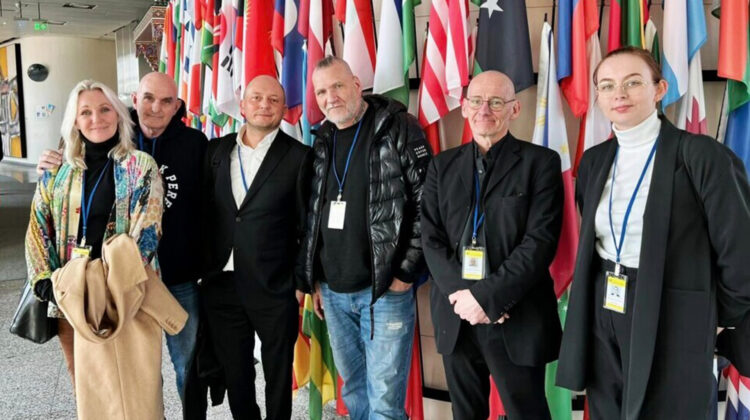
Drugreporter 22. april 2024: Ground-breaking development at the United Nations (UN) Commission on Narcotic Drugs (CND), written by Arild Knutsen, Association for Humane Drug Policy, Norway.
The CND was historic this year. A ground-breaking change occurred at the highest level of international drug policy, and it will have far-reaching consequences globally. An article by Arild Knutsen, leader of the Association for Humane Drug Policy, Norway.
Harm reduction, in other words, measures to prevent and reduce harm from the use of illegal drugs without drug use having to end, is now at the centre of the UN’s drug policy. The UN CND was also freed from the shackles of consensus. Here is an explanation of what happened, what the UN CND resolutions and the importance of consensus were all about.
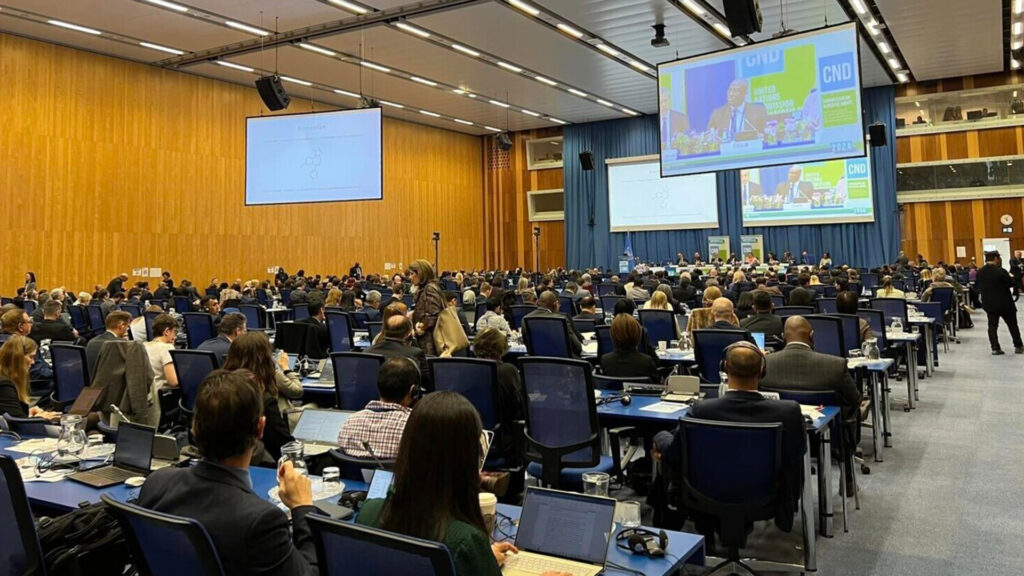
For almost 70 years, the member states of the CND have met annually and have always managed to reach an agreement on resolutions. After days of negotiation, the negotiations ended with the adoption of resolutions without a vote. During these years, it has been considered crucial for countries to reach a consensus on how they will collectively be able to tackle enormous and complicated challenges in the world with illegal drug markets. In a joint effort against organised crime and against the production, distribution and use of drugs, based on the UN Drug Conventions and the resolutions agreed upon by the UN Commission on Narcotic Drugs. Adopting a draft resolution without a vote is the basic definition of a consensus. If only one country requests a vote, a consensus has not been reached. Achieving consensus has been considered so important that if some countries have had a draft resolution but have seen, along the way, that it will not be possible to reach consensus on it, they have withdrawn the draft resolution to preserve the Vienna Spirit.
In the UN Commission on Narcotic Drugs, the attitude towards consensus is precisely called the Vienna Spirit. Resolutions are not legally binding but imply a strong influence on the countries’ authorities to implement the recommendations and priorities expressed in them. Until recently, the Vienna Spirit meant that each individual country had a kind of veto rights. Certain countries have used the need for consensus to block progressive changes in language and effort. This has contributed to a deadlock in international drug policies for decades.
As an example, it can be mentioned that the need to achieve consensus led the UN General Assembly to agree to work for a world free of drugs as late as 1998, even though many countries had long since understood that this was a meaningless utopia. This illustrates the downside of the Vienna Spirit, which has functioned as a fairly fake spirit. This year, for the first time ever, member states were unable to reach a consensus.
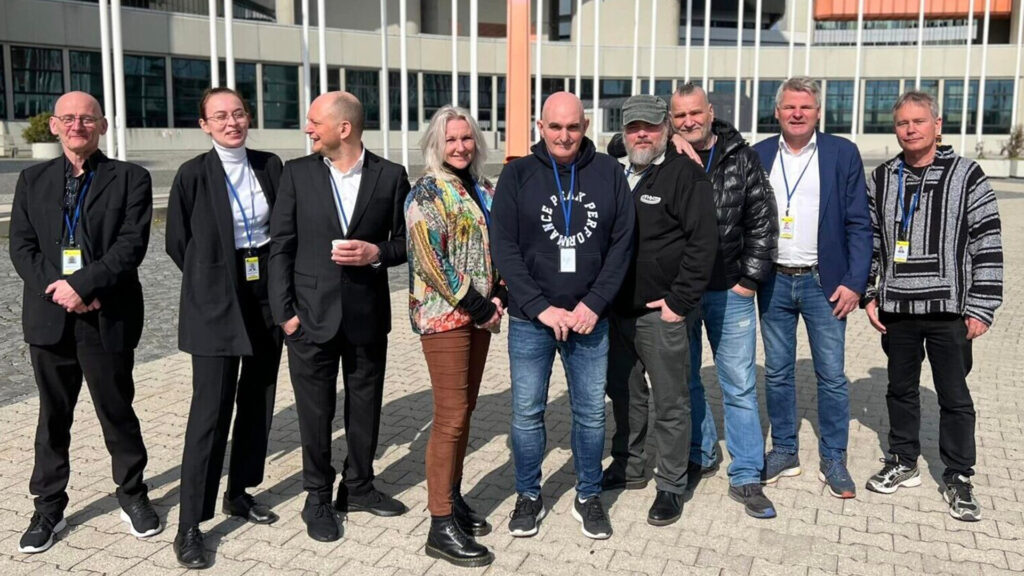
Two of this year’s four resolutions had to be voted on, and Russia and China voted against a proposal from the United States (US) for a resolution for the overdose epidemic. (The US proposed a resolution with the support of Chile, Germany, England, Australia, Belgium, Canada, Colombia, the Czech Republic, Denmark, Ghana, Guatemala, Honduras, New Zealand, Norway, Peru, Poland and Portugal). Russia and China voted against it because this resolution contained the term harm reduction, a term the US had until recently refused to accept. The draft resolution initially caused protests and led to formal negotiations between several states and informal negotiations between some of them. The negotiations lasted for over 200 hours. The term harm reduction was initially mentioned seven times and was weeded out of the text several places along the way, but in the end, it remained in one place in the resolution. Many countries supported this final draft. Other countries chose to accept it reluctantly to maintain the Vienna Spirit.
As mentioned, Russia and China voted against it, and China’s representatives explained that they accept harm reduction in that they have needle distribution and methadone treatment. However, when other countries go so far as to “‘legalise”’ drug use by creating measures such as drug consumption rooms, then it has gone too far. Therefore, China explained that they could not accept a resolution containing this term. China and Russia are not united on the issue of harm reduction; Russian authorities are strongly against needle distribution and substitution treatment.
It says something about the world situation: the countries were unable to agree for the first time in decades. At the same time, a number of countries have long since introduced harm reduction measures; some countries have decriminalised drug use; some have introduced legal regulation of cannabis; and even more are considering it. In addition, many countries are advocating a reassessment of their international control policies, and the US would probably stand with these countries rather than Russia and China, although they would probably have preferred to maintain the Vienna Spirit.
In any case, this constitutes an ever so small crack in the foundation of international drug policy. It was a powerful moment when the room erupted in applause and the US gave a victory speech after getting almost every country to vote in favour of this resolution. It was also extra heartening for us that it was precisely this part of the harm reduction flora that was to be the subject of ground-breaking development at the international level, 19 years after Norway established its first drug consumption room.
It is highly uncertain what this crack will entail in the foundation of international drug policies. First, it opened a small floodgate for further development of the policy. In the short term, this may mean that the coming years’ resolutions from CND can finally address challenges such as climate impact, indigenous peoples’ rights, the use of the death penalty, and human rights in general. It cannot be taken for granted, but there were several ground-breaking events that happened this year, which may point in that direction.
Ahead of this year’s regular CND, the UN CND held its first high-level meeting in Vienna between 14 March and 15 March. It was intended to carry out a mid-term review of the obligations set out in the Ministerial Declaration in 2019. Speeches were given by representatives of both regions and states and by leaders of UN bodies. Such as the UN Office on Drugs and Crime, the World Health Organization, UNAIDS and the UN High Commissioner for Human Rights.
All UN countries send representatives for their authorities annually. Representatives from the government attend high-level meetings, presidents, ministers and state secretaries. Until recently, the UN CND was an annual gathering where authorities from the various countries met to repeat the dogmas (undocumented claims) in their “sacred” drug conventions, where all non-scientific and non-medical use of the pagan drugs was considered both illegal and sinful. They met to brag about the number of seizures and how many actors they had taken out of the market, either by militarised means, executions or imprisonments.
There are still countries that come to CND with the same purpose, such as Russia, China, Singapore, and Iran. However, in recent years, more and more countries have advocated for placing human rights and the rights of indigenous peoples at the centre of drug policy. Drug policy organisations and drug user organisations have also started to participate, hold side events and have had good opportunities to talk to people from the delegations of the countries. This is said to have had a major impact on the changes of recent years.
Norway has observer status and is currently not a member of the UN Commission on Narcotic Drugs. This means that Norway is present with its delegation (led by Torbjørn Brekke of the Ministry of Health and Welfare). Norway supports resolutions and statements, holds side events, and participates in both formal and informal negotiations. The final results of the negotiations are adopted by countries that, at the given time, are members of the CND.
Among the highlights of this year’s high-level meeting was a statement from 62 countries, led by Colombia. (Norway is among these countries.) It calls for reform of the international drug control system and points to the disastrous consequences of the war on drugs and the importance of drug policy based on human rights. In this statement, it is pointed out that drug challenges are not only persistent but also strongly expanding and increasingly putting people’s lives, health, safety and rights at risk. In the last decade, the number of people facing drug-related challenges has increased by 45 percent globally. The supply and demand for illegal drugs have reached record highs. Simultaneously, illegal production and human trafficking contribute to a disturbing amount of violence around the world. Without that, one can trust that authorities will be able to protect people from this. In some regions, it is so bad that drug policy-related violence and crime contribute to prolonging conflict between groups. At the same time, as the spread of illegal and unregulated drugs is constantly increasing, international policies are failing to ensure legal access to regulated drugs. This causes millions to experience inhumane suffering, which could have been alleviated with medication. The 62 countries want new thinking in the international drug control system. Based on concrete knowledge, this can contribute to countries being able to make progress together. They highlight human rights, de-stigmatisation, harm reduction and the involvement of civil society as important cornerstones for achieving progress.
As Colombia’s ambassador Laura Gil says, the war on drugs prevailed in Vienna, whereas human rights prevailed in Genéva. That is where the UN Human Rights Council is based. The debate on drug policy in Vienna and the debate on human rights and health in Geneva have long been like two parallel universes, but the statement from the 62 countries can perhaps help to change this and put human rights at the centre of international drug policy.
This was also the intention of the UN High Commissioner for Human Rights, Volker Türk, who spoke at a high-level meeting for the first time in person at the CND this year. He gave a powerful speech in which he pointed out that the development is going in a negative direction at the same time as efforts against the drug markets are becoming increasingly militarised, and the number of executions for drug crimes is increasing sharply. Volker Türk pointed out that the punitive approach does not work and urged the countries to advocate more strongly for harm reduction and decriminalisation and to consider responsible regulation because the consequences of the current policy are devastating. This is the first time that a UN body has proposed the legal regulation of drugs.
Also, US Secretary of State, Antony Blinken, participated in person. And it was the first time that the US presented a Secretary of State at the CND. He came to present the aforementioned resolution on the overdose epidemic.
Then, the following week, March 18 – 22, was the regular CND. The 67th Session of the United Nations Commission on Narcotic Drugs
And that is where we participated. For the seventh time, and it was the fifth year in a row that we organised a side event there. This year, we participated together with representatives of our umbrella organisation, the Norwegian Main Organisation on Addiction and Drug Policy and the drug user organisation ProLAR Nett. It is very powerful for us to be present at CND in general, but it was a privilege to be present at this ground-breaking gathering.
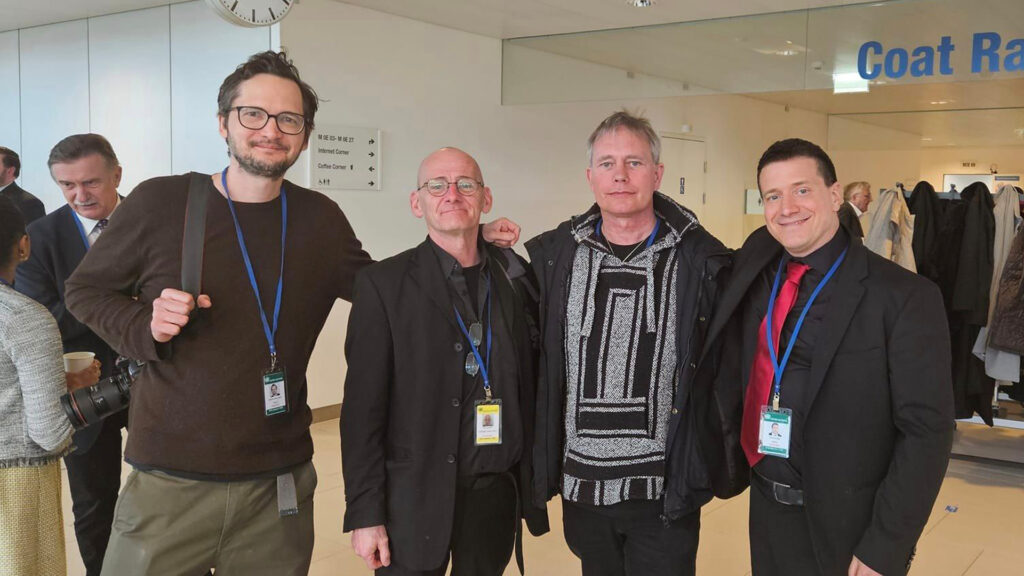
At CND, we meet activists and colleagues from drug user organizations from all over the world, who are passionate about the same topics and who have also been criminalized and subjected to humiliation from the police and health services. And who also have to live with the same risks involved in having to buy substances from the illegal market.
Among the uplifting changes at this year’s CND was the strong presence of representatives of indigenous people. An important involvement that has become particularly relevant as a result of Bolivia’s initiation of a critical review of the coca leaf’s location within the international drug control system. This is currently undergoing a process by the World Health Organization’s Expert Committee on Drug Dependence (ECDD) and will end up in a vote at the CND later.
This year, Norway organised a side event titled Empowering global drug prevention through strengthening Systems: a review of the prevention system. There, among others, the Ministry of Health and Welfare’s Torbjørn Brekke, Norway’s ambassador to Austria, Susan Eckey, and Yvonne Larsen and Aleksander Hvaring from KORUS Oslo participated in the panel. They discussed how the review of prevention systems can be useful for further efforts for knowledge-based prevention at the national and global levels. The event was supported by Canada, Finland, Slovenia, Sweden, the World Health Organization, the UNODC, the Pompidou Group, and the EMCDDA.
At another event, we heard from the organisation Unjust in England a story about a dark-skinned 15-year-old girl with dreads who came to school and was accused of using cannabis. She was pulled out of class and reported to the police. They came and stripped her completely naked, and the police found nothing on her. In England, 8,200 such strip examinations are carried out each year, and 30 percent of those subjected to them are dark-skinned. To put it into perspective, in the 2011 census, 87.1 percent of the population in England considered themselves white, 6.9 percent Asian, 3.0 percent dark-skinned and 2 percent mixed.
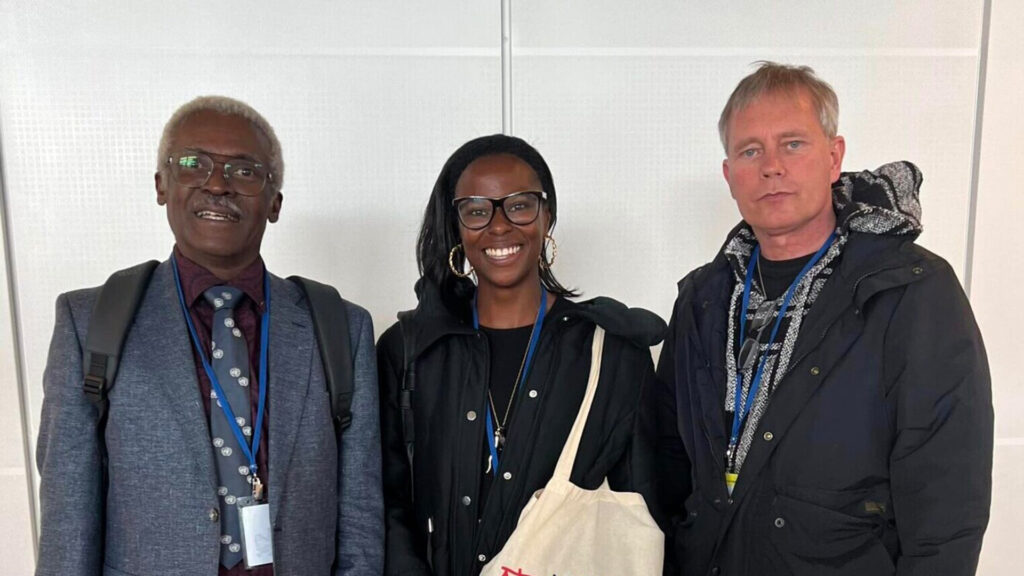
Some of those who come to CND come from countries with such high overdose rates that it is hard to comprehend. Our colleagues from USA, Canada and The United Kingdom say something important in that context. That it is the access to unregulated substances such as heroin, fentanyl and nitazine that is creating the overdose epidemic. In contrast, when these or other substances come in controlled and legal settings, they are still addictive; they can go astray, and people can die from overdose. However, that is not what leads to either the overdose epidemic, all injuries, all crimes, unevenly distributed human rights violations or overcrowded prisons.
On the other hand, this is about a demand that is not met by the authorities but is tentatively fought by them, with profoundly tragic consequences. There is much we recognise from other countries, such as that people from deprived areas have a several times higher risk of being criminalised than others. Internationally, it is particularly the poor and minorities who are hit the hardest – people with darker skins and indigenous people. We heard stories from Asia about sex workers who, when caught with one user dose, were dragged down to the police station, thrown into a cell, raped, beaten and shaved and how they never get opportunities for reintegration because of their criminal records.
It is heartbreaking to hear about all human rights violations that particularly affect vulnerable and already stigmatised groups and that are committed in the name of the drug war. Drug laws are also used by undemocratic leaders to suppress and clear oppositional journalists, lawyers and politicians. From all corners of the world, experience shows that the fight against producers, distributors, sellers and users of drugs does not affect access but increases unfortunate consequences.
At the same time, it is pleasing to see that an increasing number of countries and cities favour fundamental change. Norway is at a turning point in its drug policy but so is many other countries. We heard it during the negotiations and meetings, and we think we struck a chord in the discussion with our event: exploring legal regulation as a tool to promote human rights, health and security in Europe.
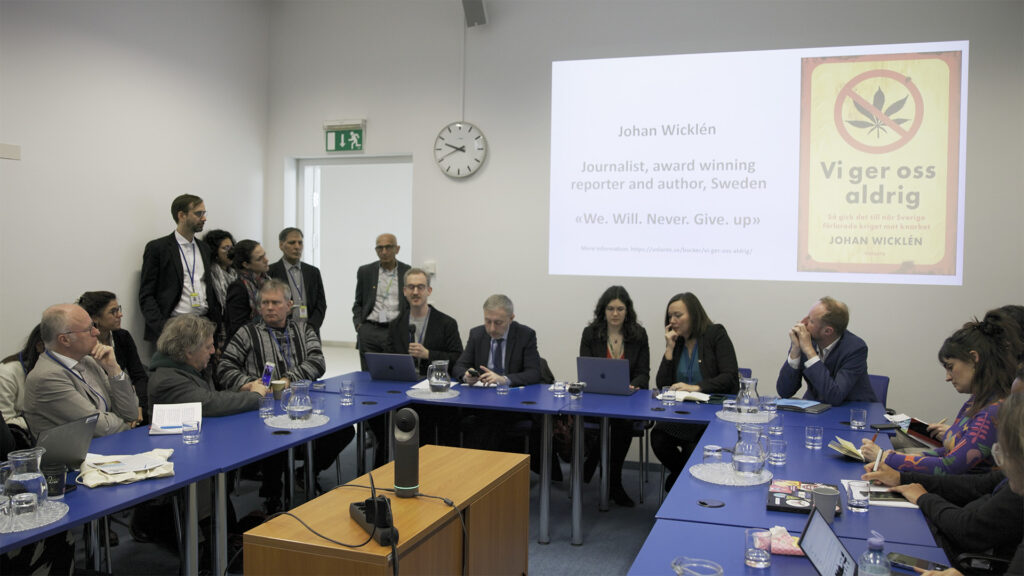
The current policy means that the authorities have no control over the market for drugs, they have no chance to regulate them, and all the money goes to criminal groups.
The development in the drug market means that organized criminal networks pose such a great danger to individuals, local communities, welfare systems and democracy that more and more people see that a thorough change is definitely needed.
Read also:
Ann Fordham and Jamie Bridge, IDPC: Harm reduction takes center stage as UN drug policy breaks free from the shackles of consensus
Péter Sárosi, Drugreporter: Breaking the taboo – Discussing Drug Regulation at the UN
Jamie Bridge, IDPC: CND67: A meeting full of milestones